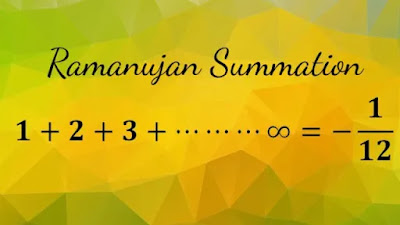Ramanujan summation
Solution given over internet :-
Let me define a variable A as 1 - 1 + 1 - 1 + 1 …..
A second variable B = 1 - 2 + 3 - 4 + 5 ….
The third and final variable C = 1 + 2 + 3 + 4 +….. which is the variable we’re interested in computing.
In A, adding values will have the whole sum oscillate between 0 and 1, so we take the average, obtaining A = 1/2.
Now, if we multiply the variable B by two, but shift the numbers over one spot, we see that 2B = 1/2, so B = 1/4.
Then, if we subtract B from C, then we have B - C = 4 + 8 + 12 + …
This can also be written as 4C. So, C - 1/4 = 4C. Multiply by 4 to obtain 4C-1=16C.
Therefore, C = -1/12.
but...
Hence if we discard the proof for this series then obviously the answer to the infinite summation of the natural numbers cannot converge to -1/12 atleast as per the basic mathematics what we understand. Hence, if we go by the definitions of mathematics, it is not possible to achieve that result.





0 Comments